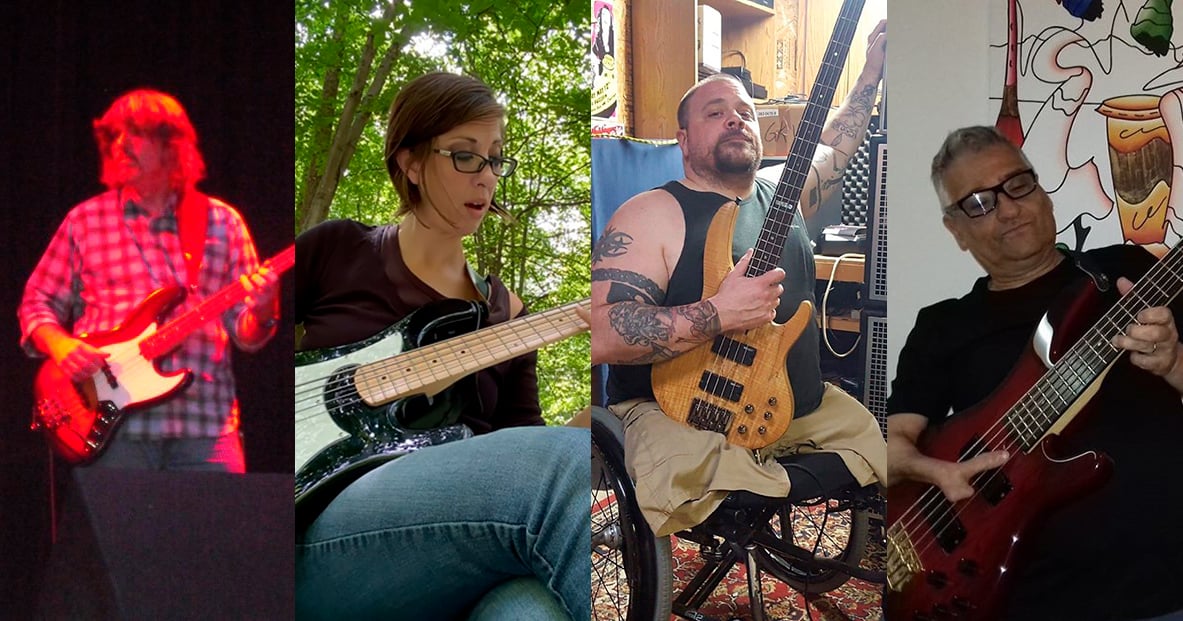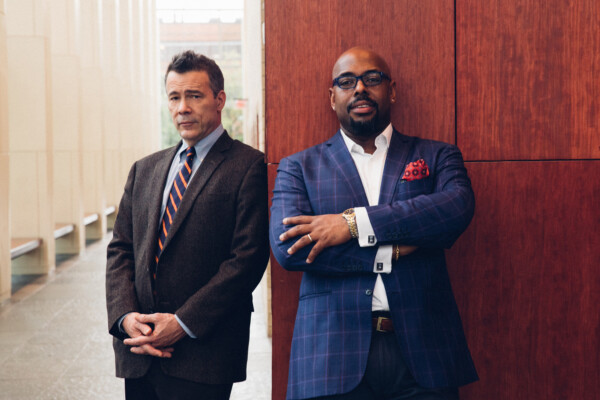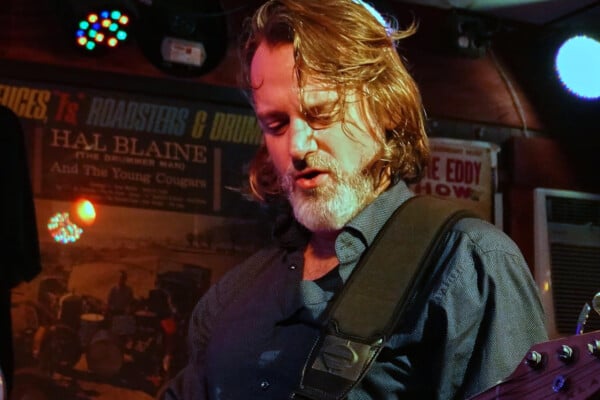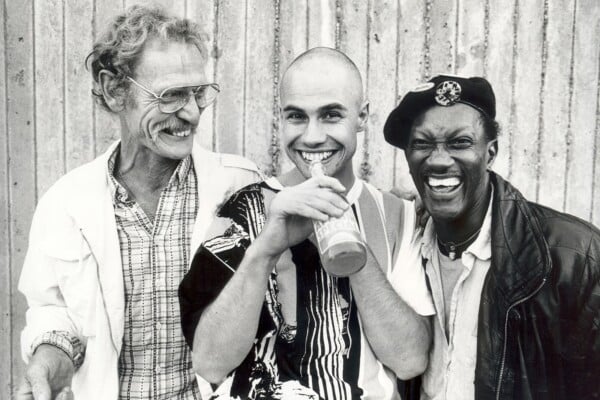Bass is My Medicine: Four Bass Players With Disabilities Reflect on Their Experiences

Learning to play bass is a challenge, but for some people, that challenge is made greater by disability. I spoke to four bass players to get some insight into how different disabilities impact on learning, playing, and gigging.
The No Treble Facebook Group is a great melting pot of bass players with different nationalities, different musical interests, and different experiences. But we all have one thing in common – we play bass. I often join in with the discussions – sometimes about minor things like the best color of Fender Jazz scratch plates, to more important things like whether Gene Simmons is a good bass player…but recently, a conversation with Ernest McDaniel (who is deaf) has focused my thinking on how disability might impact on learning to play the bass.
This prompted some further thought, and I began to consider how disabilities might also impact other areas of playing. I was lucky enough to be able to speak in-depth to four bass players with different disabilities, and they were very generous in giving me some insight into their musical lives;
Ernest McDaniel
Ernest is from Macon in Georgia and has been deaf from the age of six. His favorite bassists include Stu Cook, John Paul Jones, Garry Gary Beers, Tiran Porter, Jack Bruce, and Geddy Lee, and he plays mostly classic rock and blues.
Vanessa Rae
Vanessa is from Bloomington, Indiana, and has neurological problems related to Lyme disease. Her favorite bassists include James Jamerson, Leland Sklar, Victor Wooten, Nathan East, and Danny Mo Morris. Her band is influenced by Nirvana and Alice in Chains but also loves Morphine and Dr John.
Tim Cassidy
Tim, from Detroit, Michigan, is a double amputee wheelchair user – he was injured in a car accident when he was eighteen. He cites Geezer Butler, John Paul Jones, Flea, James Jamerson, Bootsy Collins, P-Nut, Dusty Hill, Michael Anthony, Ryan Martine, Tim Commerford, Cliff Burton, Rudy Sarzo, and Billy Sheehan as influences, and plays in a metal band called Iron Belly.
Eduardo Pandolfo
Eduardo is from Buenos Aires in Argentina and was born with an arm and hand deformity due to Thalidomide. His influences include Stanley Clarke, Ron Carter, Bunny Brunel, Abraham Laboriel, and Ray Brown. Eduardo plays Latin and jazz music, and mainly works as a soloist.
All four were very generous with their responses, and helped me to get some insight into their specific issues, and how they found ways around them.
The conversations identified some shared aspects that cropped up in their comments.
Learning – How Disability Can Impact on This:
We all learn differently, and if we have some insight into how we learn best it can enable us to learn more effectively. These are based on our senses, and we may be visual, auditory, read/write or kinaesthetic learners, or find that a combination of these in different amounts is best. If one of our senses is limited or removed, this can place a burden on our other senses. Ernest suggested that: “Not being able to identify notes/chords or key by ear has a definite impact on my bass playing. Instead of playing/learning by ear, I had to memorize entire songs – intro, verse, chorus, bridge, chord arrangements, etc – in order to play them or play with the charts on a music stand in front of me. Some songs with simple arrangements can be learned in a short time while other, more complex arrangements take longer.”
Tim says that he has; “…a brain that does not learn like other people. I have been this way all my life. I started music in my 20s right after my car wreck. I had a little brain damage. It was difficult to understand anything because I was doing all this on my own. But I just learn the way my brain wants to. That can take time, but I’m getting it done.” Tim also commented on the value of accessing a range of learning styles; “I cannot listen to something over and over till I get it. My brain shuts down when I try just tab [on its own]. I need someone to show me a few times to understand it. But then they get flustered with me. So, I need all of it; the song, the tab, and a teacher because I know one of those will stick in my brain. I don’t learn in black and white – I almost need the full rainbow.”
Although Vanessa found that her previous music studies helped her to understand the overall concepts of what she was learning, the visual-learning, pattern-based aspects of bass playing helped her to learn much more quickly. She identified patterns of notes on the bass and created a tool to show them – “I think my most important accomplishment is creating the VanRae Device – the visual key to all the patterns, because it unlocks the bass fretboard so easily and connects all the “random” patterns and puts them in context.”
The Value of Teachers and Structured Learning
Eduardo found that having a regular teacher was valuable: “I was fortunate to meet good teachers who have inspired me to study, practice, and dedicate full time.” Ernest also comments on the value of good teachers: “I’ve been fortunate to meet some good people along the way who have been helpful in my quest to be a musician. I’m grateful to all of them, especially to my music teacher Foster McMullen. I have a notebook full of songs that he charted out for me. He has the patience of a saint and I’m sure I make his job hard at times.”
Vanessa had already had some music lessons, but after switching to bass, she initially found online lessons rather than face to face learning was best for her: “Since I had studied classical guitar in high school and university, I knew that my key to becoming the bassist I want to be is music theory, and I felt confident in my self-education skills so I began to seek free online resources. Soon I wanted structure – I wanted something I could do at my own pace and was thrilled to find Ari Cap’s Music Theory for the Bass Player.”
Impressed by Ari’s theory program, Vanessa quickly signed up for Ari’s full online course: “The accountability and organization, the in-depth videos, and the monthly video conferences, have been worth every penny and then some, exploding my understanding and abilities immensely.”
Adaptation – The Changes That Make Playing Easier
Vanessa found that the weight of the bass using a traditional strap created an unwelcome strain on her arms and shoulders. She couldn’t find an ‘off-the-peg’ solution, so she designed one: “The biggest issue was from the neurodegeneration in my arms and hands. It was creating an untenable situation where my left hand and arm was going numb within five minutes of strapping on, and my right not long after, until I invented something for it…because of the numbness [in my arms and fingers]. Vanessa was determined to find something that would take the pressure away from her arms. “I did a ton of research and found that my issues and similar ones are pretty widespread. It took me a week or so of research before I had an epiphany and went up to my sewing studio and in under an hour I built the first “Stringed Bean.” Vanessa is very positive about her invention: “It’s the ultimate ergonomic accessory for shoulder-strap worn stringed instruments. It’s inexpensive, non-damaging installs in less than a minute, and is super easy to use! Gruv Gear, give me a call!”
The size and weight of the bass is also an issue for Eduardo – he comments that his ideal bass would be: “An instrument and that adapts to my body – A low weight, headless bass, 0.40 strings and high punch.” Tim’s issues were more with the shape of some basses that make it difficult to play in a wheelchair; “The Thunderbird bass has a body piece that comes up at the back top. That does not work well with me.”
Technology – How Technology Helps or Could Help to Enable Playing
Technology has been a factor in enabling disabled musicians to access musical performance, but specific, personalized adaptations could help even further. Although Ernest was a music fan and was keen to play a musical instrument, he didn’t start playing until he had digital hearing aids. These helped a lot, but he suggests that a more specialized in-ear monitor could be of great assistance: “What I think could really help with my playing and performing is probably in-ear monitors that are powerful enough to have the volume that I need. I wear powerful hearing aids that help a little, but in a band setting, it can be a wall of sound and I have difficulty hearing the vocals over the drums and guitars. Most musicians wear in-ear monitors to hear themselves play/sing and filter out unwanted noise. I need them to enhance the vocals. If there was a sound system that could feed into my hearing aids and let me control the levels of everything coming in, that would be great.”
Access – How Venues Make Life More Difficult for Disabled Players
Being a wheelchair user, Tim has found problems with getting easy access to venues: “It’s funny [that in] 2020 not everything is handicapped adapted. I [often have to] crawl up on stage and have to have my wheelchair brought up to me. But I want to play, so I do what I have to do”. But it isn’t just access to the venue and the stage, which is a problem, dealing with everyday issues like bathroom facilities can be an added issue. Tim adds: “Bathrooms are few and far between. Good thing we have back alleys and dumpsters!”
Vanessa also experiences problems at venues: “Most of the time my illness does not have any visible aspects, and I just need a quiet space like a green room or my car to get away.” She also comments about access: “[Venues could] make sure all areas required are wheelchair accessible. I don’t use a chair but I do use a cane sometimes, and the ability to roll my rig in is essential.”
Discrimination – How Disabled Players Experience This
Disabled musicians can be discriminated against by other musicians, and finding people to play with can be a challenge. Tim commented that: “I make people nervous because of my looks.” However, once that initial issue is overcome.. ”It really is all about the music once people get over it – we can jam and make music.” Vanessa finds finding others to play with a challenge: “I wish it were easier to find others to play with, but I don’t have any ideas on how to facilitate that.” Eduardo agrees: “My biggest problem is discrimination, to be able to work, [although] I always receive a great reception, from people in every place [I play]. I thank you from the bottom of my heart.”
Conclusion
I think that the main thing that we can take from this is that in the same way as bassists with disabilities, we all have different learning preferences, but we can access information from all our senses to help us to learn. When one or more of the senses is taken away, or we have issues with focus and long-term concentration, or we have a physical restriction in relation to our playing, we have to adapt our learning to suit our own situations.
Technology can assist us in many ways, but we mainly use it to allow us to access different sounds and enable better interaction with each other. Disabled musicians may find that technology allows them to access music in a more fundamental way, and make contact with other musicians more effectively.
Some aspects of being a musician can be taken for granted, such as getting in and out of venues, and onto the stage. Small changes to venues could make the lives of disabled musicians – and disabled music fans – much easier.
The stories of the four bass players who contributed to this article show that with a little adaptation, and a lot of perseverance, some issues related to disability can be overcome, but perhaps the main barrier that disabled musicians have to face is not one that is created by the disability, but by others’ attitude to it.



These players are incredible people with brilliant minds. To overcome these obstacles must have taken tremendous strength and will. They are certainly an inspiration to me. Many kudos. This was a wonderful informative piece of work Corey. ???
Hi Vinny. Thanks for your comment. I think the things that amaze me about the bassists I talked to are their determination, and their ability to develop their own way of dealing with the challenges they have.
Please ignore the question marks. Don’t know where they came from.
I truly give all respect and admiration for players who deal with disabilities, I had two brain surgeries and I found my way back from them with difficulties in memory,concentration, and I lost all my schooling mentally. With the help of the Lord and developing patience. I have found a way to be musically productive. So, I enjoyed this article with much enthusiasm!
This was a great article. I am on disability as I have schizophrenia. I struggle daily with this illness and playing bass is a constant refuge for me. One of the biggest things I struggle with is playing in front of an audience, or even with other musicians privately. I have severe social anxiety that keeps me from being able to play with others or for an audience. Still, I enjoy myself every single time I play. Thank you for these interviews, it meant a lot to me.
Hi Todd. Many thanks for your comments – much appreciated.
I took the title of the article from a comment by one of the interviewees, and I thought it was something that we could all relate to.
I’ve had a few small issues with mental health in recent years, and I’ve found that listening to music, playing the instrument at home and doing gigs with my great band mates have all been things that kept me going. Music has power to connect with an audience, but it also helps us to connect with our selves.